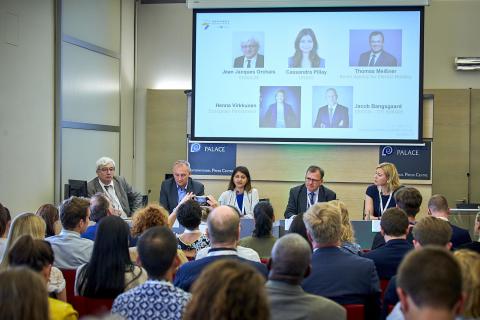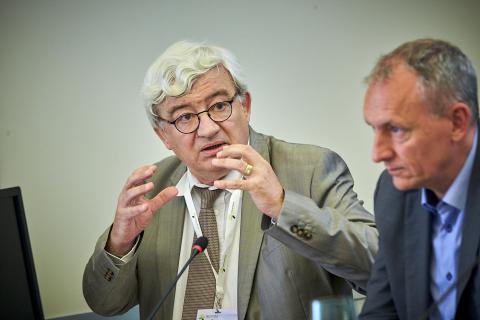Transport, energy, digitalisation – unlocking synergies for sustainability at EUSEW 2019
21 June 2019
The need to shape a sustainable energy future grows more urgent by the day. How can Europe accelerate decarbonisation and deliver on the Paris Agreement, while maintaining its global industrial leadership? What role can digital technology play in help finding solutions?
These were the burning issues on the agenda at ‘Transport, energy and digitalisation: cities’ and industry views’, a session held on 19 June during EU Sustainable Energy Week (EUSEW) – Europe’s biggest conference dedicated to renewables and efficient energy use in Europe.

Co-organised by ERTICO-ITS in collaboration with Orgalim, Eurocities and UNIDO, and moderated by journalist Hughes Belin, the event brought together experts from policy, industry and other stakeholders to discuss how digitalisation can be an enabler for sustainability by unlocking synergies across sectors such as energy and transport.
Digitally-driven transformation
The transformative potential of digital was made clear from the outset, with Finnish MEP Henna Virkkunen stating in her opening remarks: “Digitalisation and automation offer great possibilities to strengthen sustainability and boost Europe’s industrial competitiveness.” This was reinforced by Orgalim Director General Malte Lohan, who underscored the role of Europe’s technology industries in developing the innovative solutions that can transform challenges in the energy and mobility arenas into drivers of prosperity for the EU.
Moreover, Jacob Bangsgaard, CEO of ERTICO-ITS – a public-private partnership that develops and promotes intelligent transport systems and services – highlighted the role of digital connectivity and automation in making tomorrow’s mobility safer, cleaner and more sustainable.
Given the innovative ideas being developed and put into action here in the EU, Europe has a unique opportunity to lead the global low-carbon transition, as UNIDO’s Cassandra Pillay explained: with industrialising countries facing the twin challenges of developing their economies while meeting climate targets, smart technology offers a way to square the circle. Through technology transfer and sharing best practices, other world regions can benefit from Europe’s experience.
Making it happen - getting the policy framework right
Clearly, digitalisation has immense potential to shape a more sustainable future in energy and mobility. But what can EU decision makers do to fully unlock the benefits? One message came through loud and clear: an agile, innovation-friendly approach to regulation is key. “It’s our job as policymakers to set the objectives,” remarked Henna Virkkunen, “but it should be left to industry to find the solutions to get there.”
Want to read more on this topic? Check out Orgalim’s EUSEW blog on embracing transformation in the energy sector, or read our position papers on dynamic regulation for digitalisation in the energy sector and on the Commission’s ‘Clean Planet for All’ strategy.
Photo credits: EU Sustainable Energy Week on Flickr – full album can be viewed here.

LATEST NEWS
How can we create a dynamic, competitive European high-tech manufacturing base?
Orgalim's key recommendations offer policymake...

